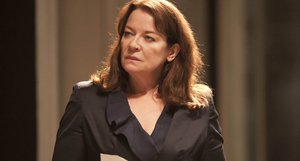The Web of Our Life: Shakespeare and Family
The third talk in a series about Shakespeare at the
National Theatre
20 April 2016, The National Theatre, South
Bank, London, Olivier Theatre
Review by Ruth Sherrington, PhD candidate, Classics

Clare Higgins, photo by Johan Persson
The third in a series of three talks about Shakespeare at the National Theatre, held to coincide with the 400th anniversary of his death, this talk centred particularly on the theme of Family, following on from Old Age and Migration. Rather than discuss the whole of Shakespeare’s output, an impossible task in an hour, the conversation focused on ‘Hamlet’ and drew particularly on the expertise of Clare Higgins, the multi-award winning actress who played the role of Gertrude opposite both Rory Kinnear (2010) and Mark Rylance (1988). Her sparring partner in the discussion was Julie Myerson, novelist, critic and Guardian journalist, and indeed there were points in the discussion when it seemed as if actual punches might be thrown since both protagonists hold strong opinions on the view of family presented by Shakespeare, Myerson seeing the play as a very modern piece dealing with the struggles of adolescents to learn their place in society, while Higgins feels strongly that the play is a work of its time dealing with the specific issues presented by membership of a particular royal family in crisis.
Genista McIntosh proved to be an excellent chair, drawing the protagonists back from some acrimonious interchanges to focus on the thematic centre of the discussion: was Shakespeare analysing family dynamics in ‘Hamlet’, and if so, what conclusions can we draw from his approach? Higgins’ take on this issue was to argue that the role of Gertrude is limited in interpretative scope since the actress is given relatively few lines and no soliloquies in which to explore or justify her actions and their motivation, while Hamlet represents ‘the young white disaffected male’ with whom society is excessively fascinated - in her opinion.
While Higgins articulated her sense of boredom with this well-worn topic, Myerson approached it from the stance of a writer who has often tackled the subject of difficult family relationships, even having written a controversial novel about the traumatic effect on her own domestic life caused by the behaviour of her teenage son. Approaching the text from this perspective, and having, by her own admission, little previous knowledge of the play, Myerson talked of her sense of the tenderness shown by Gertrude to her wayward son, and of the dilemmas faced by young people in step-parented families who feel the need to test the authenticity of everything they are told.
The evident tension between an actress who strives to breathe life into words on a page, and a writer who lives to put the words out there, created an engaging and vibrant debate. When Higgins stated of ‘Hamlet’ ‘This is not a great template for gender or family relationships’, the appreciative laughter showed how well the audience understood the dramatic tensions both in the play and on the platform.

